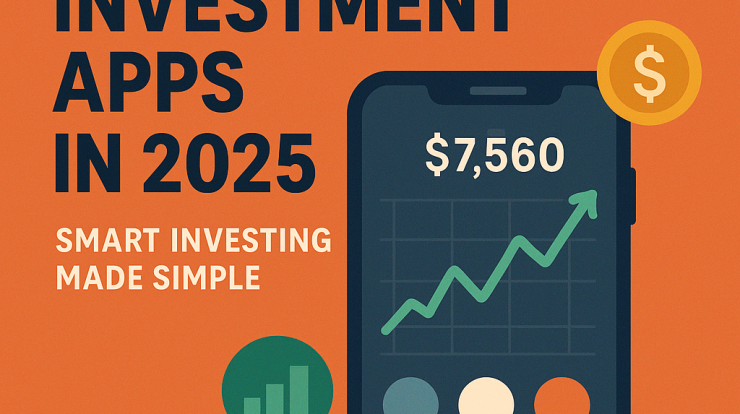
Discover the top investment apps for 2025 with AI-powered features, commission-free trading, and beginner-friendly interfaces. Start investing smart today.
The investment landscape has undergone a revolutionary transformation in recent years, with mobile technology democratizing access to financial markets like never before. As we navigate through 2025, investment apps have evolved from simple trading platforms to sophisticated financial ecosystems powered by artificial intelligence, offering everything from automated portfolio management to educational resources that guide investors at every level.
Whether you’re a complete beginner looking to invest your first dollar or an experienced trader seeking advanced analytical tools, the right investment app can be the gateway to building long-term wealth. This comprehensive guide explores the best investment apps available in 2025, analyzing their unique features, pricing structures, and suitability for different investor profiles.
Why Investment Apps Are Essential in 2025
The modern investment landscape demands accessibility, speed, and intelligence. Traditional brokerage firms, while still relevant, often lack the agility and user-centric design that today’s investors expect. Investment apps bridge this gap by offering:
Instant Market Access: Execute trades within seconds, monitor real-time market movements, and respond quickly to market opportunities from anywhere in the world.
Lower Barriers to Entry: Many apps now offer fractional shares, allowing investors to purchase portions of expensive stocks with as little as $1, making blue-chip companies accessible to all income levels.
Educational Integration: Built-in learning modules, market analysis, and investment guides help users make informed decisions rather than gambling with their money.
Automated Intelligence: AI-powered robo-advisors automatically rebalance portfolios, optimize tax strategies, and adjust risk exposure based on market conditions and personal goals.
Top Investment Apps for 2025: Detailed Analysis
1. RockFlow: AI-Powered Investment Revolution
RockFlow stands out among the top AI investing apps for 2025, offering innovative features that make investing accessible from just $1. This platform represents the cutting edge of artificial intelligence in investment management, utilizing machine learning algorithms to analyze market patterns and optimize portfolio performance.
Key Features:
- AI-driven portfolio construction and rebalancing
- Minimum investment of just $1
- Real-time market sentiment analysis
- Automated tax-loss harvesting
- Advanced risk assessment algorithms
Best For: Tech-savvy investors who want to leverage AI for portfolio optimization and those starting with minimal capital.
Pricing: Competitive management fees starting at 0.25% annually, with no minimum balance requirements.
2. Robinhood: Commission-Free Pioneer
Robinhood remains one of the best investment apps, offering commission-free trading alongside other top platforms. Having revolutionized the industry by eliminating trading commissions, Robinhood continues to evolve with enhanced features and improved user experience.
Key Features:
- Zero-commission stock and ETF trading
- Cryptocurrency trading capabilities
- Fractional share investing
- Extended trading hours
- Cash management features with debit card
Best For: Active traders and beginners who want to start investing without worrying about trading fees.
Pricing: Free stock and ETF trades, premium features available through Robinhood Gold subscription.
3. Betterment: Robo-Advisor Excellence
Betterment earned the highest possible score as one of the well-rounded robo-advisor offerings with affordable fees that deliver significant value. This platform excels in automated investing with sophisticated algorithms that handle portfolio management seamlessly.
Key Features:
- Automated portfolio rebalancing
- Tax-efficient investing strategies
- Goal-based investment planning
- Socially responsible investing options
- Human advisor access for premium accounts
Best For: Passive investors who prefer automated portfolio management and goal-based investing strategies.
Pricing: 0.25% annual fee for digital plan, 0.40% for premium plan with human advisor access.
4. Fidelity: Comprehensive Investment Ecosystem
Fidelity ranks among the best investment apps, providing a comprehensive platform for various investment needs. With decades of financial industry experience, Fidelity offers a robust mobile app that combines traditional investment services with modern technology.
Key Features:
- Zero-commission stock and ETF trades
- Extensive research and analysis tools
- Retirement planning services
- Wide range of investment options
- Educational resources and market insights
Best For: Long-term investors seeking comprehensive financial services and extensive research capabilities.
Pricing: No account minimums or maintenance fees for most accounts, with competitive expense ratios on proprietary funds.
5. Acorns: Micro-Investing Innovation
Acorns uses artificial intelligence to help beginners enter stock investing through a robo-advisor platform that automatically selects optimal portfolios based on goals, risk tolerance, and time horizon. This unique approach makes investing effortless by rounding up everyday purchases and investing the spare change.
Key Features:
- Automatic round-up investing
- AI-powered portfolio selection
- Retirement account options
- Educational content and tips
- Cashback rewards from partner retailers
Best For: Beginners who want to start investing gradually without thinking about it, and those who prefer micro-investing strategies.
Pricing: Plans range from $3 to $12 monthly, depending on features and account types.
6. Webull: Advanced Trading Tools
Webull is recognized as one of the best investment apps, particularly favored by more active traders. The platform offers sophisticated charting tools and analytical features typically found in professional trading software.
Key Features:
- Advanced charting and technical analysis
- Extended trading hours (4 AM to 8 PM ET)
- Commission-free stock, ETF, and options trading
- Cryptocurrency trading
- Paper trading for practice
Best For: Active traders and intermediate investors who need advanced analytical tools and extended trading hours.
Pricing: Commission-free trading with premium features available through Webull Pro subscriptions.
7. Ally Invest: Integrated Banking Solution
Ally Invest has carved out a strong position in the 2025 investment world, offering tools for both beginners and seasoned investors with smooth integration with Ally Bank. This integration provides a seamless financial experience combining banking and investing.
Key Features:
- Commission-free stock and ETF trading
- Integrated banking services
- Robo-advisor option (Ally Invest Managed Portfolios)
- Extensive research tools
- Competitive interest rates on cash
Best For: Investors who want to consolidate their banking and investing with one institution and prefer comprehensive financial management.
Pricing: No commission on stock and ETF trades, robo-advisor services available with competitive management fees.
Key Features to Consider When Choosing an Investment App
Security and Regulation
Trustworthy investment apps prioritize user security, using encryption, two-factor authentication, and compliance with regulatory standards. When evaluating investment apps, ensure they:
- Are SIPC-insured to protect your investments
- Use bank-level encryption for data protection
- Offer two-factor authentication options
- Maintain transparent regulatory compliance
- Provide clear information about fund protection
User Experience and Interface
The best investment apps balance sophisticated functionality with intuitive design. Look for:
- Clean, easy-to-navigate interfaces
- Fast execution speeds
- Comprehensive mobile optimization
- Customizable dashboards and alerts
- Seamless onboarding processes
Investment Options and Flexibility
Different apps specialize in different investment types – some focus on real estate through platforms like Fundrise, while robo-advisors may offer stock funds but not individual stocks. Consider whether the app offers:
- Individual stocks and ETFs
- Mutual funds and index funds
- Cryptocurrency options
- International markets access
- Alternative investments (REITs, commodities)
Educational Resources and Support
Investment apps often offer educational resources to help users understand how to grow their money, with basic investment knowledge helping make smart money choices. Quality educational features include:
- Market analysis and insights
- Investment tutorials and webinars
- Financial planning tools
- News and research integration
- Customer support accessibility
Investment Strategies for 2025: Trends and Opportunities
AI-Powered Investing
AI platforms like Betterment and Composer can fully automate investment strategies, offering cheaper and faster data analysis and automation. This technology trend is reshaping how investors approach portfolio management by:
- Analyzing vast amounts of market data in real-time
- Identifying patterns and trends human investors might miss
- Automatically adjusting portfolio allocations based on market conditions
- Optimizing tax efficiency through intelligent harvesting strategies
Sustainable and ESG Investing
Environmental, Social, and Governance (ESG) investing continues gaining momentum in 2025, with more apps offering:
- ESG-focused ETFs and mutual funds
- Impact investing options
- Sustainability scoring for individual stocks
- Carbon footprint tracking for portfolios
Cryptocurrency Integration
Digital assets have become mainstream investment options, with leading apps now offering:
- Direct cryptocurrency trading
- Crypto-focused robo-advisors
- DeFi investment opportunities
- Stablecoin options for cash management
Getting Started: A Step-by-Step Guide
1. Define Your Investment Goals
Before choosing an app, clearly identify your objectives:
- Short-term savings goals (1-3 years)
- Long-term wealth building (10+ years)
- Retirement planning
- Passive income generation
2. Assess Your Risk Tolerance
Understanding your comfort level with market volatility helps determine:
- Appropriate asset allocation
- Suitable investment strategies
- Emergency fund requirements
- Insurance needs
3. Compare App Features
Create a comparison matrix including:
- Trading commissions and fees
- Available investment options
- Minimum account requirements
- Research and educational tools
- Customer service quality
4. Start Small and Learn
Begin with a modest investment to:
- Familiarize yourself with the app interface
- Test different features and tools
- Develop your investment routine
- Build confidence before increasing contributions
Common Mistakes to Avoid
Overtrading and Timing the Market
The accessibility of investment apps can lead to overactive trading. Successful long-term investors typically:
- Focus on time in the market rather than timing the market
- Maintain consistent contribution schedules
- Avoid emotional decision-making
- Stick to well-researched investment strategies
Neglecting Diversification
While apps make it easy to buy individual stocks, proper diversification remains crucial:
- Spread investments across different sectors
- Include various asset classes (stocks, bonds, REITs)
- Consider international market exposure
- Regularly rebalance portfolio allocations
Ignoring Fees and Expenses
Even small fees compound over time, significantly impacting returns:
- Compare expense ratios on funds and ETFs
- Understand trading commission structures
- Factor in account maintenance fees
- Consider tax implications of frequent trading
Future of Investment Apps: What’s Coming Next
Enhanced AI Capabilities
The next generation of investment apps will feature:
- More sophisticated predictive algorithms
- Natural language processing for research
- Personalized investment recommendations
- Advanced behavioral analysis
Expanded Alternative Investments
Apps are increasingly offering access to:
- Private equity and venture capital
- Real estate crowdfunding
- Commodity trading
- Collectibles and alternative assets
Improved Financial Planning Integration
Future apps will provide:
- Comprehensive financial planning tools
- Insurance and estate planning integration
- Tax optimization strategies
- Multi-generational wealth planning
Conclusion
The investment app landscape in 2025 offers unprecedented opportunities for investors of all experience levels to build wealth and achieve financial goals. From AI-powered platforms like RockFlow that leverage cutting-edge technology to established players like Fidelity and Betterment that combine innovation with reliability, there’s never been a better time to start investing.
The key to success lies in choosing an app that aligns with your investment goals, risk tolerance, and preferred level of involvement. Whether you prefer the hands-off approach of robo-advisors or the control of self-directed trading, the right investment app can serve as your gateway to financial independence.
Remember that successful investing is a marathon, not a sprint. The best investment app is one you’ll use consistently over time, helping you build wealth through disciplined, long-term strategies. Start with small amounts, educate yourself continuously, and let the power of compound growth work in your favor.
As we move forward in 2025, the democratization of investing through mobile technology continues to level the playing field, giving individual investors access to tools and strategies once reserved for Wall Street professionals. Choose wisely, invest consistently, and watch your financial future unfold.
Frequently Asked Questions (FAQ)
What is the best investment app for beginners in 2025?
Five beginner-friendly apps offer education, automation, and low-cost trades to get new investors started. For absolute beginners, Acorns and Betterment stand out due to their automated investing features and educational resources. Acorns is particularly beneficial for those who want to start with micro-investing, while Betterment offers comprehensive goal-based investing with minimal effort required.
Are investment apps safe to use?
Yes, reputable investment apps are safe when they offer SIPC insurance protection, use bank-level encryption, and maintain regulatory compliance. Trustworthy investment apps prioritize user security through encryption, two-factor authentication, and adherence to regulatory standards. Always verify that your chosen app is properly regulated and insured before depositing funds.
What’s the minimum amount needed to start investing through apps?
Many modern investment apps have dramatically lowered barriers to entry. Some platforms like RockFlow allow you to start investing with just $1, while others like Acorns automatically invest your spare change from everyday purchases. Traditional apps like Fidelity often have no minimum requirements for basic accounts, making investing accessible regardless of your starting capital.
How do robo-advisors differ from traditional investment apps?
Robo-advisors occupy a middle ground between wealth managers and do-it-yourself trading platforms, using computer algorithms to provide low-cost asset allocation and build automated investor portfolios. While traditional investment apps give you direct control over buying and selling individual securities, robo-advisors automatically manage diversified portfolios based on your goals and risk tolerance.
Can I use multiple investment apps simultaneously?
Yes, many investors use multiple apps to take advantage of different features and capabilities. For example, you might use a robo-advisor for long-term retirement savings while using a trading app for individual stock purchases. However, ensure you maintain proper asset allocation across all platforms and avoid unnecessary complexity in your overall investment strategy.
What fees should I expect when using investment apps?
Fee structures vary significantly among investment apps. Top stock-trading platforms don’t charge commission fees, making stock and ETF trading free on many platforms. However, you may encounter management fees for robo-advisor services (typically 0.25-0.50% annually), expense ratios on funds, and premium subscription fees for advanced features. Always review the complete fee structure before committing to any platform.
How do AI-powered investment apps work?
AI investing apps use artificial intelligence to analyze market data, optimize portfolios, and make investment decisions. These platforms typically analyze vast amounts of market data, economic indicators, and your personal financial situation to automatically adjust your portfolio allocation, rebalance investments, and implement tax-optimization strategies without requiring constant oversight from you.
Are cryptocurrency investments available through investment apps?
Many modern investment apps now offer cryptocurrency trading alongside traditional investments. Platforms like Robinhood and Webull provide direct crypto trading, while some robo-advisors are beginning to include small cryptocurrency allocations in diversified portfolios. However, crypto investments carry higher volatility and risk compared to traditional assets, so they should represent only a small portion of most portfolios.
Read The Ultimate Beginner’s Blueprint to Stock Market Success

